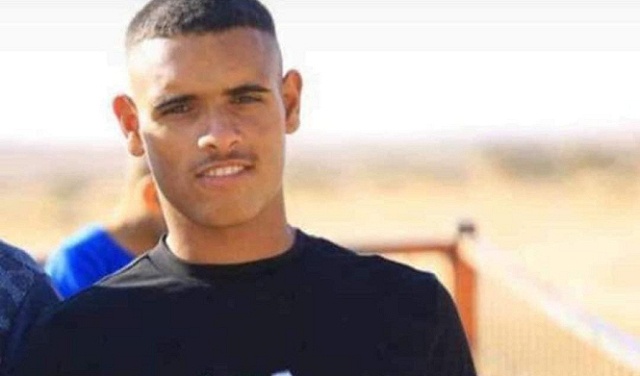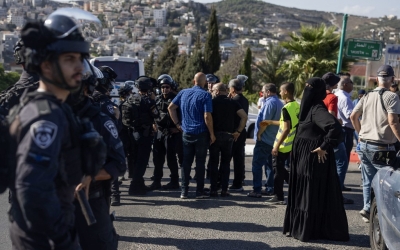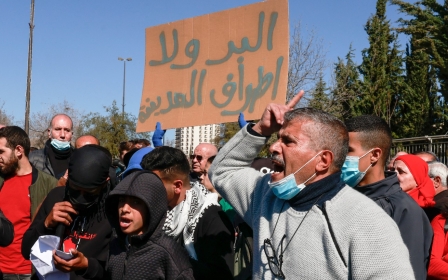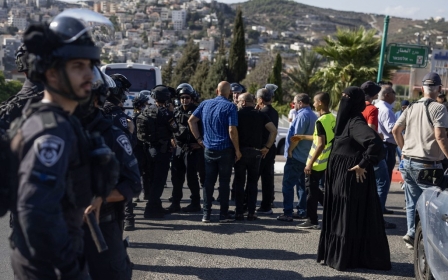Israeli forces kill Palestinian camper near Egypt border 'without threat'

Israeli forces killed a Palestinian citizen who was desert camping near the Egyptian border on Friday without apparent cause, according to his family.
The body of Yassin Abu Ruwais, 18, from the village of Bir Haddaj in the Negev region, was found by travellers passing through the area of the Halutza Sands southwest of Beersheba, according to Haaretz.
His father, Suleiman Abu Ruwais told news outlet Arab48 his son had gone on an overnight camping trip with his friends at a desert tourist spot, not far from his village.
"On Friday evening, news and rumours spread that the Israeli army had shot a young man from the village. A few minutes later, I received the news that he was my son Yassin and that he had been transferred by helicopter to Soroka Hospital in Beersheba," Suleiman said.
"I went to the hospital immediately and there I learnt that he had died."
New MEE newsletter: Jerusalem Dispatch
Sign up to get the latest insights and analysis on Israel-Palestine, alongside Turkey Unpacked and other MEE newsletters
"This news came as a shock to us. It is very painful news that I did not expect at all, and I do not wish it on anyone."
According to Haaretz, the Israeli military admitted to killing the young man though it did not "inform the public" about it.
In a statement to the Israeli daily, the military said soldiers patrolling the area spotted "two suspects... in a vehicle near the border fence with Egypt within Israeli territory" who were later shot during "suspect apprehension procedures".
'He was calm and committed to prayer, but the army’s bullets took this future away from him'
- Yassin Abu Ruwais, slain camper's father
A police source told Haaretz the soldiers suspected Abu Ruwais of involvement in smuggling across the Egyptian border.
However, Suleiman rejected the accusation against his son, asserting he was out with friends instead.
"The Israeli army says that Yassin was near the Egyptian border, the Israeli police say that he was near a military base, and we insist on our story that he was out walking with his friends," the father said.
“Yassin, [my] eldest son, was striving to build his future. He finished his school education and was taking [an] iron-welding course. He worked in agriculture. He was calm and committed to prayer, but the army’s bullets took this future away from him.”
Second killing
This is the second Israeli army killing within two months that has shaken up the local community of Bir Haddaj, with the previous case also not receiving an official statement from the army.
According to Haaretz, Israeli forces shot and killed Jumaa Al-Waj, 20, near the Egypt border at the beginning of September.
Salim Al-Danfari, the head of the popular committee in the village, says the community has faced increasing racism under the current government, "which has contributed to the ease of shooting at Arabs in the country".
"These events increase the threat to the lives of the residents, especially during the current war," al-Danfari told local media.
“We have previously tried the judicial path in these cases, and they closed the files without doing us justice."
Abu Ruwais' father held similar sentiments, saying that his son's killing showed the army's "ease" in targeting Palestinians within the country.
"This shows the racist policy towards [Palestinians] in the Negev, as this is not the first time that the army has killed a young man from the village."
Palestinian citizens of Israel are estimated to make up about 20 percent of the Israeli population. They were granted citizenship in 1948, when the state of Israel was proclaimed, but they have long faced discrimination, racism, and economic disenfranchisement.
Around 300,000 of them live in the Negev region, including 100,000 who live in 30 unrecognised villages that lack essential public services, including means of transportation, roads and schools.
Palestinian citizens in the Negev say that Israeli authorities have attempted to force them out and destroy their nomadic way of life for decades through various tactics.
These include confiscation of lands from native Palestinians and turning landowners into tenants. Additionally, the Israeli government has been accused of preventing the expansion of Palestinian villages and encircling them with new Jewish settlements.
Middle East Eye delivers independent and unrivalled coverage and analysis of the Middle East, North Africa and beyond. To learn more about republishing this content and the associated fees, please fill out this form. More about MEE can be found here.





